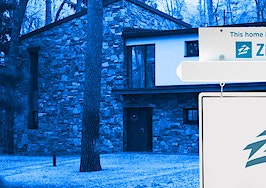Offering ammunition to agents who argue that iBuyers are often deceptively expensive, a new study by real estate data analyst Collateral Analytics has determined that the typical cost of using an iBuyer ranges between 13 and 15 percent.
Entitled “iBuyers: A new choice for home sellers but at what cost?” the study conflicts with claims made by some iBuyers on just how expensive such services wind up costing homeowners. Opendoor, for example, represents its service as more affordable than a real estate agent. But if the new research is correct, using an iBuyer would generally cost consumers two to three times more money than if they simply used a traditional agent.
“In all, the typical cost to a seller appears to be in the range of 13% to 15% depending on the iBuyer vendor,” write the authors of the report, Collateral CEO Dr. Michael Sklarz and Dr. Norman Miller, senior vice president of research and development with the firm. “For some sellers, needing to move or requiring quick extraction of equity, this is certainly worthwhile, but what percentage of the market will want this service remains to be seen. ”
The analysis adds to a growing debate over the value of iBuyers. Some agents argue these startups often bilk homeowners while others contend iBuyers are a reasonable option for their clients. The divergent views came into sharp relief during two Inman Connect panels last month in which agents shared their experiences with iBuyers. 
The report was not framed as an indictment of iBuyers. It describes the service as “a welcome alternative to traditional brokerage” for a portion of motivated homesellers. However, its most notable contribution to a nascent body of research on iBuyers involves its cost estimate of the service.
The report noted iBuyers charge sellers a convenience fee ranging from 6 percent to 9.5 percent, with some also docking the seller “for fees typically paid by buyers at closing, adding another 1 percent or more.” IBuyers tend to ask for “generous” repairs based on the results of a home inspection while some, such as Offerpad, pay for moving costs, write the authors of the study.
This all means that the total direct cost of an iBuyer “ignoring repair credits” is between 7 and 10 percent, versus the “typical 5 to 9 percent combined seller and buyer costs with a traditional broker,” according to the study. “Yet, that is not the end of the story or the comparison,” the authors write.
Due to costs and risks of holding and reselling their acquisitions, iBuyers must make “conservative” offers, according to the report.
“The more unique the home, the worse the season for selling, or the more competing inventory is present in the local market, the more conservative will be the offer price,” the study asserts.
To pinpoint the typical discount that iBuyers pay for homes, the report’s authors compared purchase prices of two unidentified iBuyers with home value estimates generated by Collateral Analytics’ automated valuation model (AVM) — a model that report claims “correlates very well with actual market values.”
The analysis used a sample of 6,000 transactions that took place across four markets — Phoenix, Atlanta, Charlotte, and Las Vegas — from January 2016 to February 2019. The report did not identify the two iBuyers, but a source familiar with the study confirmed they were Opendoor and Offerpad.
Offerpad spokeswoman Cortney Read said Offerpad’s average service fee is 7 percent and that some homes require only minor repair costs. She also added that Offerpad believes the report “does not accurately compare the mentioned fees,” focusing only on commission for real estate agents, while including other costs for iBuyers that “should be also reflected in the traditional real estate agent percentage amount.”
Opendoor didn’t immediately respond to a request for comment.
According to the study, one iBuyer bought homes at a median discount (the median discount off market value that the iBuyer purchased homes at) of 4.5 to 6.9 percent. The other iBuyer paid a median discount of 2 to 3.3 percent.

These discounts reportedly have declined modestly over the years. In 2016, for example, one iBuyer’s discount was about 7 percent, while the other’s was around 3.5 percent. By 2019, those numbers stood closer to 2 and 4.5 percent, respectively.
The authors theorized that “pressure to deploy capital” may have “reduced the spread [between how much iBuyers pay for homes and how much they’re worth] as the iBuyer market matures.” Some of that pressure has likely come from Zillow Offers and other ventures that are trying to take a bite out of the growing iBuyer market.
“Ultimately, the spread [the discount paid by iBuyers] will be at an appropriate level to compensate the iBuyers for liquidity risks and capital costs,” they said.
Thus, the study’s “preliminary empirical results” suggest that sellers are paying “not just the difference in fees of 2 to 5 percent more than with traditional” agents, and a generous repair allowance, but also an additional 3 to 5 percent more to “compensate the iBuyer for liquidity risks and carrying costs.”
Taking all of this into account, the authors conclude the typical cost of using an iBuyer ranges from 13 to 15 percent depending on the company.
This cost estimate is in line with estimates from some agents that spoke about iBuyers at Inman Connect Las Vegas, but a bit higher than an estimate published by Market Watch: 11 percent.
The cost makes sense from a business perspective, the report notes. IBuyers must cover carrying expenses and deal with a number of risks including home burglaries, price declines and “adverse selection.”
The last risk refers to the risk that sellers who know about hard-to-discover negative characteristics of their home will be more likely to sell their homes to iBuyers at prices that iBuyers would not pay were they aware of those flaws.
“Not all sellers are better informed than the iBuyers,” they write. “Still, there is some risk of informed sellers taking advantage of relatively high offers.”













